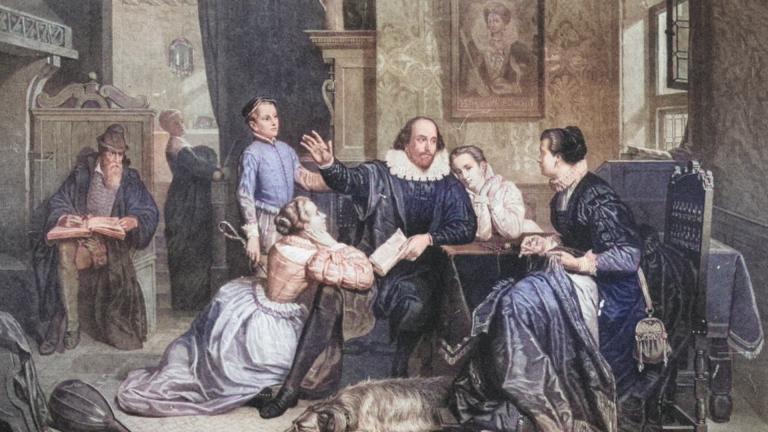
Read more about Tudor History

We tend to think of William Shakespeare as a writer with a quill in one hand and a skull in the other. But like anyone else, he was also a father. And in 1596, he lost his only son.
Hamnet Shakespeare was just 11 when he died. His life was short and barely documented. Though naturally, historians believe his death had a profound impact on Shakespeare, including potentially influencing some of his later plays.
At Sky HISTORY, we’re always interested in what inspired some of history’s most fascinating minds. And when it comes to Shakespeare, the death of his son is one of those quiet but powerful turning points.
William Shakespeare and Anne Hathaway had three children. Susanna was the first, born in 1583 when William was just 18. Two years later came twins: a daughter named Judith, and a son named Hamnet. Yes, Hamnet. The spelling might seem like a typo today, but it wasn’t unusual at the time. Hamnet and Hamlet were often used interchangeably in Elizabethan England.
The family lived in Stratford-upon-Avon while Shakespeare spent much of his time in London building his career and launching shows at the Globe Theatre. He was climbing fast: writing comedies, histories, sonnets… the works. But in August 1596, news reached him that would cut through all of that.
Hamnet was dead at just 11 years old.
The records are frustratingly sparse. All we know for certain is that he was buried on 11th August 1596 in Stratford. There’s no official cause of death as it wasn’t routine for parish records to include this information in the 16th century. It’s also unclear whether William Shakespeare himself was able to attend his son’s funeral in Stratford.
So what happened? Some historians point to a plague outbreak that swept through the town that summer. Others suggest illness or an accident. The reality? We’ll probably never know.
There’s a noticeable shift in Shakespeare’s work in the years following Hamnet’s death. Gone is the high-energy wit of A Midsummer Night’s Dream. In its place come the darker, heavier plays like King John, Julius Caesar (inspired by the legendary Roman ruler), Twelfth Night
, and, most famously, Hamlet.
It’s tempting to draw a line between Shakespeare’s son and the Prince of Denmark. The names alone invite comparison. And when you look closer, the parallels multiply. Both Hamnet and Hamlet are sons. Both die young. Both leave their parents reeling. Coincidence?
Some scholars argue Hamlet is less about revenge and more about grief. It’s a play where the living struggle to make sense of death, where loss haunts every scene. If you read it that way, the connection to Hamnet feels less like speculation and more like subtext.
There are other moments, too. In King John, Shakespeare writes:
Grief fills the room up of my absent child,
Lies in his bed, walks up and down with me,
Puts on his pretty looks, repeats his words,
Remembers me of all his gracious parts,
Stuffs out his vacant garments with his form.
Then, have I reason to be fond of grief?
Fare you well: had you such a loss as I,
I could give better comfort than you do.
I will not keep this form upon my head,
When there is such disorder in my wit.
O Lord! my boy, my Arthur, my fair son!
My life, my joy, my food, my all the world!
(King John, Act III, Scene 4)
Unlike his father, Hamnet didn’t leave behind any plays, poems, or even a diary. But his presence can be felt through his father’s later works. Every time Hamlet is performed for an audience, every time an actor recites the tearjerking lines from King John, Hamnet Shakespeare is there.
Recently, celebrated author Maggie O’Farrell decided to shift the narrative and write her first historical novel, Hamnet.
'I have been fascinated by Hamnet ever since I first studied Hamlet at school,' O’Farrell explained in an interview. 'I was always baffled and saddened by how little mention he receives in biographies and literary criticism, so I decided to write a novel about him, to attempt to give him a voice and a presence.'
Still curious? If thoughtful stories like this, the ones that sit unassumingly behind the curtain instead of taking centre stage, are your thing, sign up to the Sky HISTORY newsletter and get weekly features straight to your inbox.